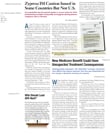Reps. Jim Ramstad (R-Minn.) and Patrick Kennedy (D-R.I.) are staunch supporters of mental health parity and are committed to establishing broad-based support in Congress for legislation to help people with mental illnesses, especially substance abuse. As part of that effort, they have set out to educate their colleagues in Congress about chemical addiction through the bipartisan Addiction, Treatment, and Recovery (ART) Caucus in the House of Representatives.
The caucus is one of many groups, called Congressional Member Organizations, that members of Congress can create to pursue common legislative objectives, according to the Members' Congressional Handbook of the Committee on House Administration.
Ramstad, who introduced legislation last month in the House to establish parity for substance abuse benefits (see article at left), and Kennedy formed the ART Caucus in March 2004 and now are its chairs. Their mission is to educate members of Congress and their staffs about chemical addiction and promote access to treatment and recovery, according to Karin Hope, Ramstad's health legislative aide.
At least 66 members of the House have joined the caucus since its inception, according to Hope. Two-thirds of the members are Democrats, and the remaining third are Republicans, according to Ramstad's office.
The briefings are often organized and/or sponsored by private groups such as the Friends of the National Institute on Drug Abuse or the Association of Recovery Schools, Hope said.
Charles Curie, M.A., the administrator of the Substance Abuse and Mental Health Services Administration, and Nora Volkow, M.D., the director of the National Institute on Drug Abuse, have been featured speakers at caucus briefings, Hope pointed out.
The ART Caucus also held a joint briefing with the Congressional Caucus on Fetal Alcohol Spectrum Disorders (FASD) last month. Ramstad and Rep. Frank Pallone Jr. (D-N.J.) co-founded the caucus last year. Studies estimate that approximately 40,000 infants are born with FASD annually, which translates into about 1 of every 100 births, according to the National Organization on Fetal Alcohol Syndrome, which organized the briefing.
“This condition is unique among birth defects, because it is 100 percent preventable through abstinence from alcohol during pregnancy,” said Ramstad and Pallone in a letter last month urging members of Congress to attend the caucus briefing.
More information on the Congressional Caucus on FASD is posted online at<www.house.gov/pallone/fasd_caucus/> and on the ART Caucus at<www.house.gov/ramstad/caucus/Addiction/AddictionINTRO.htm>.▪
